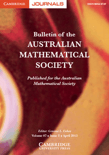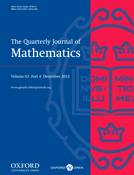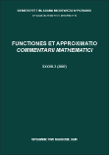
FIBONACCI QUARTERLY
metrics 2024
Connecting Researchers through Mathematical Discoveries
Introduction
Fibonacci Quarterly is a notable journal published by the Fibonacci Association, focusing on the captivating realms of mathematics and its applications, particularly Algebra and Number Theory. With its ISSN 0015-0517, the journal serves as a vital platform for the dissemination of original research and innovative ideas within its field. Established in the United States and operating since its inception, the journal covers an extensive timeline of contributions from 1996 to 2008 and continues its journey of academic excellence with ongoing publications through 2024. Currently ranked in the Q3 category for Mathematics (Algebra and Number Theory) as of 2023, Fibonacci Quarterly has established itself as an essential resource for researchers and practitioners alike, despite its modest Scopus rank of #91 out of 119 with a 23rd percentile ranking. Although not an open-access journal, it provides crucial insights and advancements that fuel scholarly discussions and foster academic growth in the mathematical community. Whether you are a researcher, a professional, or a student, Fibonacci Quarterly offers a wealth of knowledge that enriches the understanding of number theory and algebra, making it an indispensable resource in the pursuit of mathematical clarity and innovation.
Metrics 2024
 0.29
0.29 0.40
0.40 0.40
0.40 29
29Metrics History
Rank 2024
Scopus
IF (Web Of Science)
JCI (Web Of Science)
Quartile History
Similar Journals

BULLETIN OF THE AUSTRALIAN MATHEMATICAL SOCIETY
Connecting Researchers and Ideas in the World of MathematicsBULLETIN OF THE AUSTRALIAN MATHEMATICAL SOCIETY is an esteemed journal dedicated to advancing the field of mathematics, published by Cambridge University Press. Since its inception in 1969, this periodical has fostered scholarly communication and showcased pivotal research in various domains of mathematics, now projected to continue until 2024. With an impact factor that places it in the Q2 category of miscellaneous mathematics research, it holds a notable position among its peers, ranking 215th out of 399 in the Scopus database. Though it does not currently offer open access options, the journal remains a vital resource for researchers, professionals, and students seeking to deepen their understanding of mathematical advancements. The Bulletin serves as a crucial platform for disseminating original research, comprehensive reviews, and insightful perspectives that navigate the complexities of mathematics today, ensuring the community is well-informed and engaged.

Notes on Number Theory and Discrete Mathematics
Exploring the Depths of Number Theory and Discrete MathematicsNotes on Number Theory and Discrete Mathematics is a distinguished journal published by the BULGARIAN ACADEMY OF SCIENCE, dedicated to advancing research in the fields of number theory and discrete mathematics. Renowned for its scholarly contributions, this journal serves as a platform for researchers, professionals, and students to disseminate their findings and engage in critical discourse. The journal’s ISSN is 1310-5132 and its E-ISSN is 2367-8275, enhancing its visibility and accessibility in the academic community. While it currently operates under traditional access constraints, the journal is committed to fostering an open exchange of ideas and methodologies that drive innovation in mathematical research. By focusing on theoretical developments and applications, Notes on Number Theory and Discrete Mathematics plays a pivotal role in the ongoing exploration of mathematical principles, appealing to a broad audience and helping to shape the future of the discipline.

JP Journal of Algebra Number Theory and Applications
Connecting Concepts: Algebra Meets Number TheoryJP Journal of Algebra Number Theory and Applications is a distinguished publication within the field of mathematics, specifically focusing on algebra and number theory. Published by PUSHPA PUBLISHING HOUSE, this journal serves as a platform for researchers and professionals to disseminate their cutting-edge findings and innovative methodologies. With its ISSN 0972-5555, it caters to an audience eager to explore mathematical concepts and applications that impact various scientific domains. Although it operates on a subscription model, the journal's commitment to high-quality peer-reviewed content makes it a valuable resource for students and scholars alike. The journal offers an exclusive insight into the complex interplay between algebra and number theory, ensuring that it remains at the forefront of mathematical discourse despite its coverage discontinuation from Scopus. The absence of an H-Index and low rankings within Scopus underscore the challenges the journal faces in a competitive academic landscape; however, it continues to foster a community for the exchange of ideas and the advancement of knowledge in mathematics.

QUARTERLY JOURNAL OF MATHEMATICS
Exploring the Depths of Mathematical InnovationQuarterly Journal of Mathematics, published by Oxford University Press, stands as a pivotal resource for the mathematical community, focusing on a broad spectrum of topics in the field of mathematics. With its esteemed history dating back to 1930, this journal continues to foster innovative research and discussions, providing a platform for scholars to share their findings and insights. Although the journal currently holds a Q3 classification in mathematics (miscellaneous) and is ranked #207 among general mathematics publications in the Scopus database, its commitment to quality and rigorous peer review ensures that it remains relevant and insightful. Researchers, professionals, and students alike will find the Quarterly Journal of Mathematics an invaluable tool for advancing knowledge and understanding in various mathematical disciplines, making it an essential addition to any academic library.

Periodica Mathematica Hungarica
Fostering Excellence in Mathematical Research and Applications.Periodica Mathematica Hungarica is a prestigious academic journal published by Springer, focusing on the field of mathematics, with a particular emphasis on miscellaneous mathematical studies. Established in 1971, this journal has maintained its commitment to advancing mathematical research and its applications, making significant contributions over its converged years through 2024. With a Q2 ranking in the mathematics category as of 2023, it establishes itself as a vital resource within the mathematical community. Researchers and academics will find its inclusion in the Scopus database, ranking #189 out of 399 in general mathematics, indicative of its impact and relevance. Although it does not feature open access, the journal provides a wealth of high-quality peer-reviewed articles, thereby serving as an essential platform for the dissemination of innovative mathematical theories, methodologies, and findings. Engaging with the content of Periodica Mathematica Hungarica is crucial for anyone looking to stay at the forefront of mathematical research and development.

Rad Hrvatske Akademije Znanosti i Umjetnosti-Matematicke Znanosti
Advancing Knowledge in Mathematical SciencesRad Hrvatske Akademije Znanosti i Umjetnosti-Matematicke Znanosti is a distinguished journal published by the Croatian Academy of Sciences and Arts, focusing on the vast domain of mathematics and its multifaceted applications. Established in Croatia, this journal serves as a vital platform for scholars and practitioners to disseminate innovative and significant research findings in mathematical science. With an ISSN of 1849-2215, it has been indexed in Scopus, achieving a notable Q3 ranking in the miscellaneous category of mathematics, which reflects its influence and reach within the academic community. While currently not classified as an open-access journal, it endeavors to offer accessible insights and foster collaboration among researchers, professionals, and students. Published annually, it spans diverse topics critical to advancing mathematical understanding and promotes the exchange of ideas across international boundaries. Emphasizing quality, this journal contributes to the ongoing dialogue in the mathematical sciences, thereby strengthening academic ties and enhancing knowledge dissemination.

Journal de Theorie des Nombres de Bordeaux
Exploring the Depths of Number TheoryJournal de Theorie des Nombres de Bordeaux is a distinguished publication dedicated to the realms of algebra and number theory, emerging from the esteemed University of Bordeaux and specifically the Institut Mathématiques Bordeaux. With its ISSN number 1246-7405 and E-ISSN 2118-8572, this journal has been a pivotal platform for researchers since its inception in 1996, and it continues to foster innovative mathematical scholarship through 2024. Notably, the journal is recognized in the Q2 category of 2023 in both Algebra and Number Theory, affirming its significance within the academic community where it ranks #99 out of 119 in its field according to Scopus metrics. Although it operates without open access, it provides valuable insights and peer-reviewed articles that contribute to the ongoing dialogue in mathematics. As the global interest in number theory intensifies, the Journal de Theorie des Nombres de Bordeaux remains an essential resource for mathematicians, researchers, and students alike, encouraging rigorous exploration and dissemination of knowledge in this vital area of study.

Hacettepe Journal of Mathematics and Statistics
Pioneering Research in the Heart of Mathematics and StatisticsHacettepe Journal of Mathematics and Statistics, published by Hacettepe University in Turkey, is a vital platform for scholars in the fields of mathematics and statistics. With a commitment to promoting rigorous research, this journal covers a diverse range of topics including Algebra and Number Theory, Analysis, Geometry and Topology, and Statistics and Probability. Since its inception in 2008 and looking forward to its continued convergence up until 2024, it has established itself as a resource for both theoretical and applied mathematics. Although it currently holds a Q4 ranking in Algebra and Number Theory and Q3 in multiple other categories, its commitment to quality research is evident through its Scopus rankings, positioning it favorably among its peers. The journal operates on an open access model, facilitating wide dissemination of knowledge, and is particularly appealing to researchers, professionals, and students aiming to stay at the forefront of mathematical sciences. With an E-ISSN of 2651-477X, the Hacettepe Journal of Mathematics and Statistics aspires to foster collaboration and innovation in the mathematical community.

FUNCTIONES ET APPROXIMATIO COMMENTARII MATHEMATICI
Illuminating the Path of Mathematical DiscoveryFUNCTIONES ET APPROXIMATIO COMMENTARII MATHEMATICI is an esteemed academic journal published by WYDAWNICTWO NAUKOWE UAM, based in Poznań, Poland. With a focus on a diverse array of topics within the field of mathematics, this journal plays a vital role in disseminating innovative research and fostering collaboration among mathematicians and scholars worldwide. As of 2023, it holds a respectable Q3 rank in the miscellaneous mathematics category, indicating its relevance and contribution to the broader mathematical community. While the journal currently operates without open access options, its commitment to quality research is reflected in its rigorous editorial standards and a broad scope of articles spanning theoretical advancements to practical applications. Researchers and practitioners alike will find this journal to be an invaluable resource for cutting-edge mathematical discourse, contributing to its convergence years from 2006 to 2024. For those seeking to enhance their knowledge and engage with pioneering work in mathematics, FUNCTIONES ET APPROXIMATIO COMMENTARII MATHEMATICI stands out as a noteworthy publication.

Journal of Combinatorial Algebra
Pioneering Open Access Research in Combinatorial AlgebraThe Journal of Combinatorial Algebra, published by the European Mathematical Society (EMS), is a pioneering open-access journal dedicated to advancing research in the fields of Algebra and Number Theory, as well as Discrete Mathematics and Combinatorics. Since its inception in 2018, the journal has been committed to promoting high-quality, rigorous research, evidenced by its 2023 scopus rankings placing it in the second quartile across both disciplines. It serves as a vital platform for academics, researchers, and students to share innovative findings, methodologies, and theoretical advancements within combinatorial algebra, facilitating collaboration and knowledge dissemination in the mathematical community. With its open access policy adopted in 2021, the journal ensures that its content is freely available to a global audience, further enriching the landscape of mathematical research. The journal's editorial board, composed of leading experts, guarantees the integrity and academic excellence of published articles, making it an essential resource for those engaged in the dynamic fields of combinatorics and algebra.